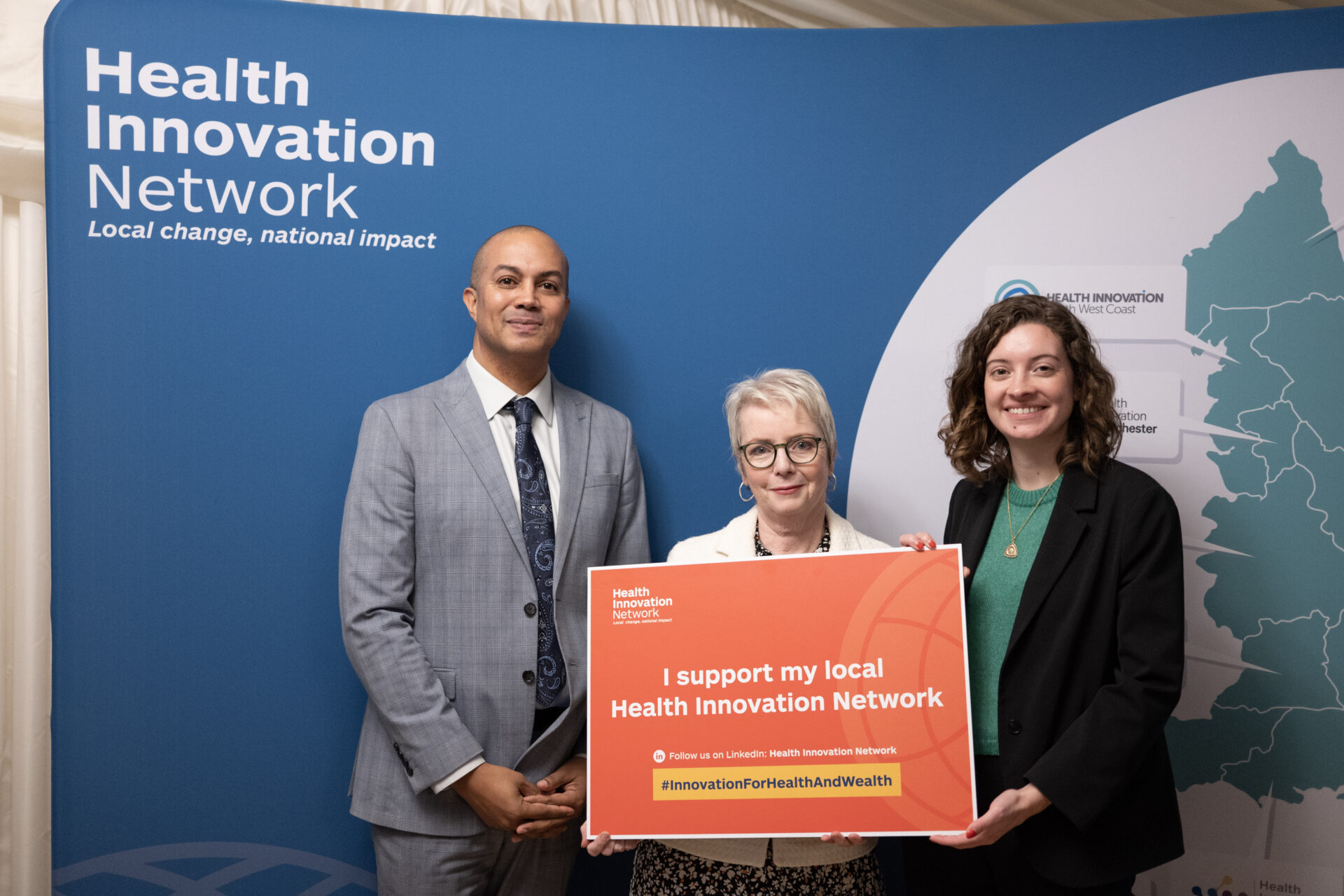The Health Innovation Network welcomes the Innovation Ecosystem Programme (IEP) recommendations, published today (28 November 2024).
Achieving greater impact and value from faster and more extensive adoption of health innovation is critical to delivering the three shifts articulated by Government and expected to be emphasised in the 10 year plan; analogue to digital, hospital to community, treatment to prevention. It is also vital to delivering on the growth agenda through increased productivity and economic growth.
Yet, innovation adoption is notoriously difficult to achieve at pace and scale, and requires a concerted effort by the whole ecosystem to make it easier for everyone to achieve.
The Innovation Ecosytem Programme report rightly highlights the need for a focus on clearly defined national health innovation priorities, incentivising the partnership working required to deliver innovation, and improved alignment and shared accountability for innovation adoption performance.
Our decade’s experience of innovating in the NHS has demonstrated that innovation is a team sport, and it works best when all the necessary players are enabled to play their specific, but coordinated, roles as the examples laid out in this report highlight.
We also warmly welcome the call for investment in the innovation adoption capability and capacity that is required to deliver impact from innovation at pace and scale, and the focus this report places on the people, culture and tools to deliver transformation is hugely reflective of our own experience.
Innovation is not an off the shelf product that gets delivered to the system. While technology is often the focus, widespread adoption of innovation requires organisational and cultural shifts, which in turn need practical support and guidance to achieve.
It also, as the report signals, requires local adaptation. The Network has spent a decade building relationships across the ecosystem at local, regional and national levels, making us uniquely placed to convene all parts of the ecosystem to deliver transformation. Local change, national impact is at the heart of everything we do.
Despite this vital review pre-dating the change in Government, these recommendations rightly highlight the huge potential of health innovation’s role to deliver on the Government’s health and growth missions, and well-articulates how critical building a focus on supporting the implementation of innovation should be to the 10 year plan and Innovation Adoption Strategy.
We are delighted to have been a part of this important work, and the 15 local health innovation networks stand ready to adapt and respond to help implement the recommendations, and look forward to working with partners to deliver on the ambition of the Innovation Ecosystem Programme, in a locally relevant way.
How health innovation networks can support the recommendations of the Innovation Ecosystem Programme
Local change, national impact
We welcome the call for clear national priorities that are not the sole responsibility of the NHS to deliver but are committed to collectively by the wider ecosystem and supported and invested in over a longer period of time (5-10 years).
Ensuring these nationally coordinated funding programmes build on the existing research and innovation ecosystems will be vital. These ecosystems have formed based on the natural connections between clinical, research and industry relationships and are assets to leverage, to enable adaptation of innovation in different local contexts (e.g. metropolitan, suburban, rural and coastal) to ensure we tackle health inequity.
As a collective of 15 local organisations, fully embedded in local research ecosystems, the Network is well placed to support such programmes working in partnership with local innovation ecosystems. See our work in partnership with the NIHR on the National Innovation Prioritisation Programme to understand more about how we deliver local change, national impact.
Support for innovators
Alongside targeted investment into national priorities, support for innovators from a wider pool beyond innovation priorities that continues to support local creation and safeguarding of jobs, and leveraging inward investment into life science industries will remain vital.
We have a national pipeline of over 3000 innovations that we will continue to support locally, regionally and nationally, to develop into scalable, adoption-ready propositions that deliver patient and system impact, and drive economic growth across the whole country.
We hope to use our insights gained from this work to support with the prioritisation process, which must focus on both the demand (health and care system priorities) and supply of innovation (emerging high-promise technologies).
Support for health and care teams
The IEP recommendations rightly recognise the importance of the culture, capabilities and capacity needed to deliver innovation, and highlight the important role for Royal Colleges in delivering this change. The Health Innovation Network is also a vital part of the ecosystem whose skills in innovation implementation capacity and capability building should be explicitly drawn on to support this work.
We understand how to support systems to deliver innovation and have a wealth of experience to draw on, from protected innovation roles, to capacity building in local systems through academy programmes and training, to support systems to drive adoption of innovation. Read about Health Innovation North West Coast’s Coaching Academy, Health Innovation East Midland’s Innovation Academy or Health Innovation Wessex’s Innovation Adoption training offer.
We have experience of delivering across a range of approaches to support ICBs, providers and PCNs to create innovation capability and capacity in existing structures, and we understand the importance of ensuring investment into innovation adoption capacity and capability is protected, drawing on the experience protecting operational capacity to drive research (with NIHR).
We hope that creating the dedicated capacity for innovation testing and adoption can draw on the experience of the Network. Learn more about some of our work in this area in our latest Workforce Impact Report.
Partnering for success
We have over a decade’s experience developing the partnership working between the NHS and the life sciences’ sector that the report signals is vital to achieving the ambition to become a global leader in testing and implementing new technologies at scale. Read the recent announcement of the partnership between Health Innovation Manchester and Eli Lilly.
We are delighted to have been a part of the Innovation Ecosystem Programme and stand ready to adapt, respond and work with partners across the ecosystem to help implement the recommendations.

The Health Innovation Network is delighted to announce the launch of Innovation Insights, a brand-new webinar series designed to highlight the latest in health innovation, offering attendees valuable insights into the adoption and spread of innovation within the health and care landscape. Each interactive webinar will feature: Expert presentations: Delivered by thought leaders across [...]

The Health Innovation Network, at an event sponsored by Sarah Coombes MP, brought together parliamentarians including Health Minister Karin Smyth MP and Chair of the Science, Innovation and Technology Committee, Chi Onwurah MP to meet with six innovators supported by health innovation networks across the country and their NHS partners. At the Meet the Innovators: [...]

The need for fast-paced innovation in healthcare is widely acknowledged. And ensuring that healthcare innovation is shaped by the people it serves remains a pressing priority – one made all the more evident by the growing emphasis on health equity in the 10 Year Health Plan. Patient voices are often cited as central to healthcare [...]









